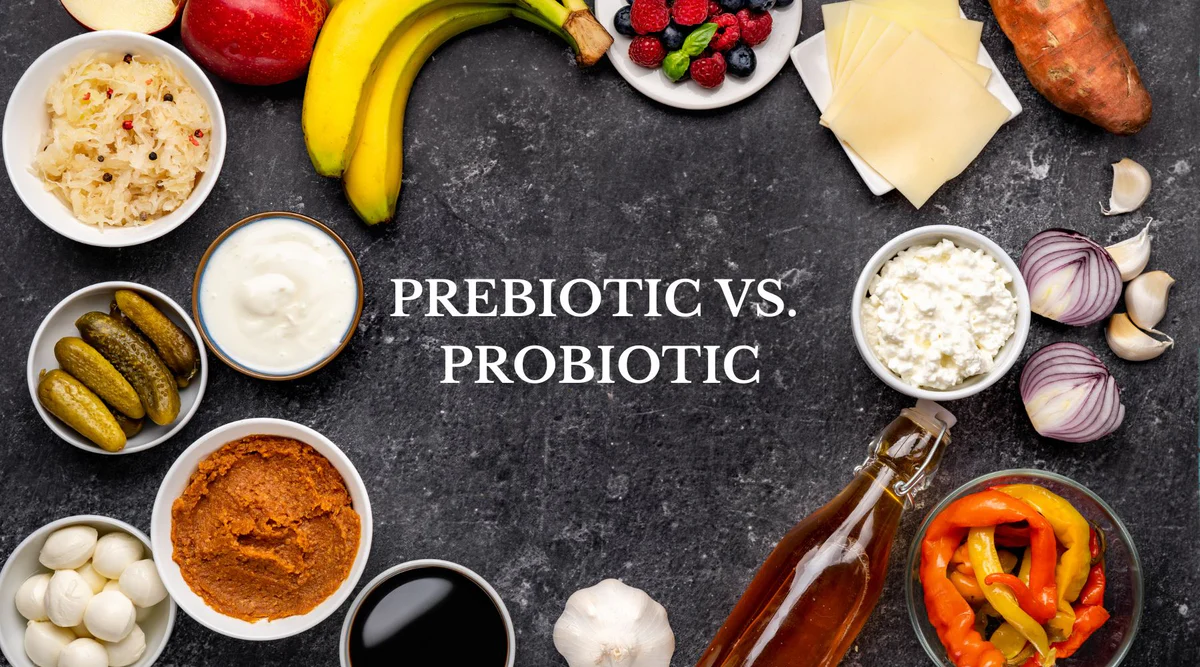Why Tart Cherry Is the…
Blog by Sherry Larson Why Tart Cherry Is the Natural…
Table of Contents
Toggle
Gut health plays a crucial role in overall well-being, impacting digestion, immunity, mental clarity, and even emotional stability. Two essential components for a balanced gut microbiome are prebiotics and probiotics. While both contribute to a healthy digestive system, they serve different functions and must work together to maintain optimal gut health.
This article explores the differences between prebiotics and probiotics, their unique health benefits, and how to incorporate them into your diet for maximum wellness.
What Are Prebiotics?
Prebiotics are a type of dietary fiber that serves as food for the beneficial bacteria in your gut. Unlike probiotics, which introduce new bacteria into the microbiome, prebiotics nourish and support the growth of existing beneficial bacteria, ensuring a balanced gut environment.
Health Benefits of Prebiotics
Top Prebiotic Foods
What Are Probiotics?
Probiotics are live microorganisms—often referred to as “good bacteria”—that help maintain the balance of the gut microbiome. These beneficial bacteria contribute to digestive health by replenishing the gut flora and keeping harmful microbes in check.
Health Benefits of Probiotics
Top Probiotic Foods
How Prebiotics and Probiotics Work Together
Prebiotics and probiotics work in synergy to maintain a balanced and healthy gut. Probiotics introduce good bacteria into the gut, while prebiotics nourish and sustain them, ensuring their long-term survival.
Combining Prebiotics and Probiotics for Maximum Benefits
For optimal gut health, incorporate both prebiotics and probiotics into your daily diet.
Final Thoughts
Understanding the difference between prebiotics and probiotics is key to maintaining optimal gut health. While prebiotics serve as fuel for beneficial bacteria, probiotics introduce live cultures that support digestion, immunity, and overall well-being.
By incorporating a variety of fiber-rich prebiotic foods alongside probiotic-rich fermented foods, you can create a diverse and thriving gut microbiome. This, in turn, promotes better digestion, stronger immunity, improved mental health, and long-term wellness.
Blog by Sherry Larson Berberine: Nature’s Secret Weapon for Blood Sugar, Inflammation & More If you’re looking for…
Blog by Sherry Larson Shilajit: Nature’s Ancient Energy Tonic for Modern Burnout We’ve all felt it—that sluggish, wired-but-tired…
Blog by Sherry Larson Celery Juice: The Gut-Healing, Liver-Loving Morning Ritual You Didn’t Know You Needed If you’ve ever felt…
Blog by Sherry Larson Milk Thistle: The Detox Defender Your Liver Has Been Waiting For Milk thistle might…
Blog by Sherry Larson The Link Between Ultra-Processed Foods and Cancer: What They’re Not Telling You Every day,…
Blog by Sherry Larson Understanding High Cortisol: Signs, Causes, and Natural Ways to Balance It Cortisol, commonly known…
Blog by Sherry Larson The Truth About Red Meat and Health: Why the Real Culprit May Not Be What You…
Blog by Sherry Larson The Hidden Dangers of Diet Cola: What You Need to Know Diet cola has…
Blog by Sherry Larson 14 Ways to Begin Healing Your Gut and Transform Your Health …
copyright © 2025 Anti-Inflammatory Approach. All rights reserved. Unauthorized reproduction, distribution, or use of any content, including text, images, recipes, or other materials on this website, is strictly prohibited without prior written permission. This website’s content is provided for informational purposes only and does not constitute medical or professional advice.